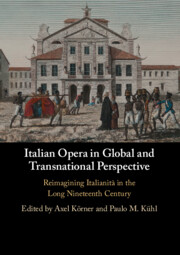 Italian Opera in Global and Transnational Perspective
Italian Opera in Global and Transnational Perspective Teresa Carreño’s 1887 Italian Opera Company in Caracas
Published online by Cambridge University Press: 17 March 2022
Teresa Carreño’s 1887 operatic season in Caracas is a notorious episode in Venezuelan musical history: an attempt to launch an Italian opera company by the country’s most celebrated pianist that ended in dismal failure. Invited by President Guzman in 1885 to give a series of recitals – and subsequently to start a permanent opera company – Carreño was by then in the glory years of her career. Studies of Carreño have long emphasised the symbolic importance of Carreño’s time in Caracas in the 1880s, highlighted by her composition of an 'Himno a Bolivar' during the visit. Less frequently discussed, however, is that the majority of the operatic troupe were in fact recruited from New York, where Carreño had settled in the previous decade, and from where she had pursued concert tours across the United States. The chapter reassesses Carreño’s failed operatic experiment both through the lens of her North American networks and against the shifting relations between New York, Venezuela and Italy at this time. It provides a framework for later activities within Latin America by the US operatic gramophone industry, and underlines the problematic status of Italian opera’s 'civilising' ambitions for local Venezuelan elites. If Venezuela could easily be subsumed into clichés of italianità abroad, then Italian opera was an uneasy and surprisingly mobile symbol of cultural progress.
To save this book to your Kindle, first ensure no-reply@cambridge.org is added to your Approved Personal Document E-mail List under your Personal Document Settings on the Manage Your Content and Devices page of your Amazon account. Then enter the ‘name’ part of your Kindle email address below. Find out more about saving to your Kindle.
Note you can select to save to either the @free.kindle.com or @kindle.com variations. ‘@free.kindle.com’ emails are free but can only be saved to your device when it is connected to wi-fi. ‘@kindle.com’ emails can be delivered even when you are not connected to wi-fi, but note that service fees apply.
Find out more about the Kindle Personal Document Service.
To save content items to your account, please confirm that you agree to abide by our usage policies. If this is the first time you use this feature, you will be asked to authorise Cambridge Core to connect with your account. Find out more about saving content to Dropbox.
To save content items to your account, please confirm that you agree to abide by our usage policies. If this is the first time you use this feature, you will be asked to authorise Cambridge Core to connect with your account. Find out more about saving content to Google Drive.